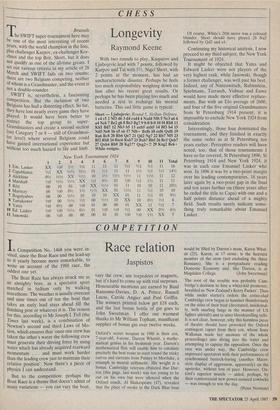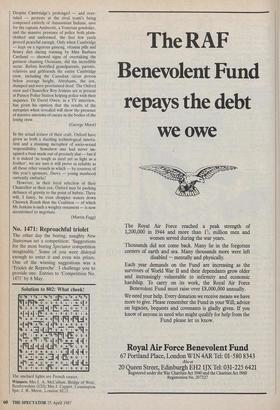COMPETITION
Race relation
Jaspistos
In Competition No. 1468 you were in- vited, since the Boat Race and the lead-up to it yearly become more remarkable, to write an account of the 1988 race, the oddest one yet.
The Boat Race has always struck me as an almighty bore, as a spectator sport matched in tedium only by walking marathons. The weather is usually overcast and nine times out of ten the boat that takes an early lead stays ahead till the finishing post or whatever it is. The reason for this, according to Mr Joseph I. Fell (the Times last week), is a combination of Newton's second and third Laws of Mo- tion, which ensures that 'once one crew has taken the other's water the following crew must generate their driving force by using water which has already acquired rearward momentum . . . and must work harder than the leading crew just to maintain their relative position'. Now there's a piece of physics I can understand.
But to the competition: perhaps the Boat Race is a theme that doesn't admit of many variations — you can vary the boat, vary the crew, use torpedoes or magnets, but it's hard to come up with real surprises. Honourable mentions are earned by Basil Ransome-Davies, D. A. Prince, Russell Lucas, Carole Angier and Paul Griffin. The winners printed below get £18 each, and the last bonus bottle of gin goes to John Sweetman. I offer our warmest thanks to Mr William Topham, munificent supplier of bonus gin over twelve weeks.
Oxford's secret weapon in 1988 is their cox, 7-year-old, 4-stone, Darren Whatsit, a mathe- matical genius in his freshman year. Darren's mathematical flair will enable him to calculate precisely the best route to steer round the tricky curves and currents from Putney to Mortlake, a triumph in mental arithmetic. His weight is a bonus. Cambridge veterans objected that Dar- ren (this page, last week) was too young to be out on his own but were silenced when the Oxford coach, Al Shakespeare (47), revealed that the place of stroke in the Dark Blue boat would be filled by Darren's mum, Karen What- sit (25). Karen, at 17 stone, is the heaviest member of the crew (not excluding the three Russians). She is a postgraduate reading Domestic Economy and, like Darren, is at Magdalen College. (John Sweetman) The root of the trouble was probably Cam- bridge's decision to hire a whizz-kid promoter, heralded as 'New Zealand's Kerry Packer'. Thus while under starter's orders the cerise-clad Cambridge crew began to hammer thunderously on the sides of their boat (decorated, incidental- ly, with snarling fangs in the manner of US fighter aircraft) and to utter bloodcurdling yells. It is not clear, however, why this harmless piece of theatre should have provoked the Oxford contingent (apart from their cox, whose Sony Walkman made her unaware of the whole proceedings) into diving into the water and attempting to capsize the opposition. Once the race was under way, the Cambridge crew impressed spectators with their performances of synchronised buttock-baring (another Maori- style display of aggression, apparently) on the upstroke, without loss of pace. However, Ox- ford's superior muscle — aided, perhaps, by their controversial new power-assisted rowlocks — was enough to win the day. (Peter Norman) Despite Cambridge's prolonged — and over- ruled — protests at the rival team's being composed entirely of Amazonian Indians, save for the captain Andreotti, a Venetian gondolier, and the massive presence of police both plain- clothed and uniformed, the first few yards proved peaceful enough. Only when Cambridge — kept on a rigorous ginseng, vitamin pills and honey diet during training by Miss Barbara Cartland — showed signs of overtaking the guttural chanting Oxonians, did the incredible occur. Before horrified grandparents, parents, relatives and girlfriends the entire Cambridge crew, including the Canadian circus person below average height, Abrahams, the cox, slumped and were proclaimed dead. The Oxford crew and Chancellor Roy Jenkins are at present at Putney Police Station helping police with their inquiries. Dr David Owen, in a TV interview, has given his opinion that the results of the autopsies when revealed will show the presence of massive amounts of curare in the bodies of the losing crew.
(George Moor)
In the actual texture of their craft, Oxford have given us both a dazzling technological innova- tion and a stunning metaphor of socio-sexual responsibility. Somehow one had never im- agined a boat made out of precisely that — but if it is indeed 'as tough as steel yet as light as a feather', we are sure it will prove as reliable as all those other vessels in which — by courtesy of this year's sponsors, Durex — young manhood currently embarks!
However, in their loyal selection of their Chancellor as their cox, Oxford may be pushing defiance of gravity to the point of hubris. There will, I fancy, be even choppier waters down Chiswick Reach than the Coalition — of which Mr Jenkins is such a weighty ornament — is now accustomed to negotiate.
(Martin Fagg)



































































 Previous page
Previous page